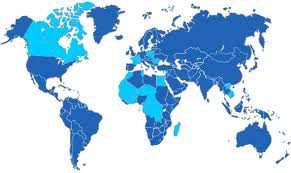By Conor Godfrey on April 21, 2011
Today was the final day of a festival for La Francophonie in Washington, DC.
Story tellers-book signings-movies-wine- food-you get the idea.
La nuit du Conte, or story telling night, was especially good.
I enjoyed several of the events, but my time in West Africa made me struggle with the entire concept
of la Francophonie.
I mean—why celebrate shared pain? Was France not the colonizer, the unlawful, insensible oppressor?
In theory, la Francophonie refers to communities all over the world united by the use of the French language (either in the home, or politics, or school, or commerce, etc..), and further, posits a sense of shared identity based on language and other cultural traits.
I have been to a number of far flung parts of la Francophonie—several countries in French speaking West Africa, Cambodia, Montreal, and France, and through work I have met Cajuns and Burundians, Belgians and Swiss, and several other Francophones to boot, and it is 100% true that speaking French binds these communities together on a level that exceeds simply ease of communication.
For whatever reason, I bond with people from Togo or Burkina far faster than people from Ghana or Nigeria even if the French speaking Togolease and/or Burkinabe converse fluently in English.
However, the notion of La Francophonie makes West Africans schizophrenic.
The same educated Guineans or Senegalese who berate the French every chance they get for interfering in West African politics, or for the crappy job they did colonizing West Africa, also place tremendous stock in their personal ability to speak the French ‘de Moliere’.
The wealthy send their children to France to be educated, and congregate at France-Afrique cultural events.
What about the rest of la Francophonie?
What do older Cambodians and Haitians have in common?
What do Cajuns from New Orleans share with Belgians?
Or Burundians with Caribbean islanders?
I ‘m tempted to say nothing, except that I have seen the magic of the French language work time and time again.
I can’t bring myself to call la Francophonie a scar held in common, nor can I explain it as a shared memory of pain—it is more complicated than that.
From the very beginning, the French colonies understood la Francophonie differently.
Léopold Sédar Senghor (President of Senegal), Hamani Diori (President of Niger), Norodom Sihanouk (Head of State Cambodia), Jean-Marc Léger (Leading party member, Canada) all yearned to belong to the French community, even as they all struggled with their own national identities.
Seku Toure (President of Guinee) and several others staked their reputations on separating themselves form anything smacking of French-ness
Seku even banned French in schools, and attempted to teach Guinean school children in their local languages.
This of course led to a half generation of children torn between French and their mother tongue and achieving a high level in neither.
I suppose there is nothing intrinsically abnormal with celebrating shared ties even when those ties are buried in psychological wounds.
Many U.S. elites aspired to British culture long after the American Revolution ended.
I guess I was so convinced in the intrinsic value of West African cultures that I lost sight of the fact that culture is never static—societies evolve and adapt to new influences, be they good, bad or indifferent.
The fact that the French exerted tremendous influence on West African societies might simply make those tapestries richer.
When I think of the Bambara civilization in Mali, or a number of Fertile crescent or South American societies, I always think of them as being diluted by foreign (usually European) invaders, but the truth is those societies were being invaded or influenced by numerous other societies long before Europeans set foot on their shores.
La Francophone can be repossessed and re-defined by the communities that belong—it does not have to be a shared memory of subservience.